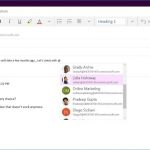Google has broken SHA-1 encryption

After two years of research, Google has shown that it has successfully broken SHA-1 encryption. The company is yet to release details of how it achieved the first SHA-1 "collision", but has released a proof of concept.
In keeping with its own disclosure policy, details of how the encryption was effectively broken will be released after 90 days. In the meantime, you can take a look at two specially-crafted PDF files that have identical SHA-1 hashes but different content (the definition of a collision).
Google and Jigsaw create Perspective technology to identify abusive comments

Any website that allows contributions from visitors -- whether it is a platform such as Twitter or a site that has a comments section -- has to contend with the problem of abuse, swearing and harassment. Manually keeping on top of this sort of content can be a hellish task, but Google and fellow Alphabet subsidiary Jigsaw have launched a new technology called Perspective to help automate things.
The technology uses machine learning to identify what are being called "toxic comments" (defined as "a rude, disrespectful, or unreasonable comment that is likely to make you leave a discussion") so they can be dealt with appropriately.
Red Hat: 'use after free' vulnerability found in Linux kernel's DCCP protocol IPV6 implementation

Red Hat Product Security has published details of an "important" security vulnerability in the Linux kernel. The IPv6 implementation of the DCCP protocol means that it is possible for a local, unprivileged user to alter kernel memory and escalate their privileges.
Known as the "use-after-free" flaw, CVE-2017-6074 affects a number of Red Hat products including Red Hat Enterprise Linux 6, Red Hat Enterprise Linux 7 and Red Hat Openshift Online v2. Mitigating factors include the requirement for a potential attacker to have access to a local account on a machine, and for IPV6 to be enabled, but it is still something that will be of concern to Linux users.
Organizations can avoid 94 percent of critical Microsoft vulnerabilities just by killing admin rights

When vulnerabilities are found in Microsoft products, collective breaths are held until the company releases security bulletins. But analysis of security issues by software manufacture Avecto shows that the overwhelming majority of these vulnerabilities can be mitigated against by simply removing administrator right from users.
Avecto CEO Mark Austin and CTO Marco Peretti say that organizations need to address the problem of "over privileged users". The duo say that this would help to avoid the security problems caused by 94 percent of critical vulnerabilities in Microsoft products. The research also found that Windows 10 had the highest proportion of vulnerabilities of any operating system.
Updates to Windows 10 Mail and Calendar apps bring Focused Inbox, @mentions and more

Microsoft is pushing out updates to the Mail and Calendar apps in Windows 10, introducing a number of new features including the Focused Inbox we've already seen in the mobile version of Outlook.
The new features come ahead of "architectural improvements" that will speed up performance, and Microsoft is seen borrowing ideas heavily from Google's Gmail and Calendar tools in a bid to make its own apps more useful and helpful.
Gboard for iPhone updated with Google Doodles, new emoji and voice typing

Google's Gboard keyboard made its debut on iOS, and it was a few months before the company brought the app to its own Android platform. Today a major update to the iPhone version of the keyboard sees the arrival of voice typing, meaning that users will be able to dictate messages rather than typing by hand.
In addition, the update introduces new emoji, support for additional languages, as well as easy access to Google Doodles and information about them.
Study shows that whistleblowers need greater protection due to surveillance and anti-privacy tech

A study by London University's Institute of Advanced Legal Studies (IALS) shows that journalists find it harder to protect their sources in the digital age, and suggests that whistleblowers should be afforded greater legal protection. The arrival of Donald Trump on the scene has created a greater sense of urgency.
The report, entitled "Protecting Sources and Whistleblowers in a Digital Age", says that monitoring of phone calls as well as online surveillance means it is now easier to identify sources that would otherwise have remained anonymous. People like Edward Snowden and Julian Assange have brought whistleblowing into the spotlight in recent years, and proposed changes to the UK's Official Secrets Act that would deny using "public interest" as a defense, coupled with the increased interest in surveillance mean that this is a hot topic once again.
Twitter lets customer support operatives use custom profiles with their direct messages

Having become the medium through which upset customers often turn to in order to complain to companies or ask questions, Twitter is fully embracing its role as a customer service platform. But while Twitter is a neat and quick way to get in touch with a company, it tends to have something of an impersonal feel.
This is about to change as Twitter is rolling out a new feature that lets customer service representatives personalize direct messages with their own name and image rather than that of the company they work for. Will this splash of personality help customers feel valued in a marketplace awash with bots?
Differential sync will speed up OneDrive from Q2 2017

It has been some time since Microsoft mentioned that differential sync would be coming to OneDrive, and the company's latest roadmap shows that it is due to arrive some time in the second quarter of this year.
The feature will help to save time and bandwidth by only synchronizing parts of a file that have been updated. It's something that users of Microsoft's cloud storage service have been requesting for a long time now, and years of asking will soon come to an end.
Paid-for Google Site Search to be phased out and replaced by free, ad-supported version

Emails to customers reveal that Google plans to kill off Google Site Search this spring. While customers who have paid for the service will continue to have access to it, no new licenses or renewals will be sold after 1 April, 2017.
As reported by Fortune, customers will be migrated to Google's ad-supported Custom Search Engine once their license or search limit expire. The move illustrates Google's on-going and growing reliance on advertising income, and it's something that is unlikely to be well-received by web users who are already sick of being inundated with ads.
Microsoft unveils Skype Lite, an Android app for India that's light on data usage

Microsoft has thrown a lot at Skype in recent years, and the latest move sees the company releasing a completely new version of the Android app designed for use on slower internet connections -- specifically in India.
Described variously as being "our fastest and smallest app to date" and "built in India, for users in India", the focus with Skype Lite is on speed and efficiency. The new version of Skype uses less data and battery power, but still delivers the Skype experience that users have come to rely on.
Security breaches cost Yahoo dearly as Verizon reveals amended terms of acquisition

Yahoo's frankly terrible track record with security just cost the company $350 million. Having originally offered to buy the company for $4.83 billion, Verizon has now revealed that it is dropping its offer to $4.48 billion.
The announcement from Verizon comes just days after it was rumored that the company was thinking of lowering its offer by $250 million in the wake of security breaches suffered by Yahoo. The two companies have also agreed to share "certain legal and regulatory liabilities arising from certain data breaches."
Apple appeals against $14 billion European tax bill with 14-point legal plea

Last year Apple was hit with $14 billion tax bill after the European Commission decided the company had enjoyed "illegal tax benefits" in Ireland. Apple said that it would appeal against the ruling which Tim Cook described as "maddening", but Europe is showing increased interest in cracking down on technology companies taking advantage of tax loopholes.
The appeal has now been placed, and Apple is asking the appeal court to either partly overturn the Commission's ruling and pay its legal fees, or completely overturn the ruling. The fact that Apple is setting forth two possible outcomes would indicate that it feels a full annulment of the original ruling is unlikely, but it has submitted a 14-point appeal.
Microsoft confirms another 2017 update after Windows 10 Creators Update

If you're not a Windows Insider, it has been a little while since your copy of Windows 10 received a major update -- but that is about to change. 2017 will see the release of not one, but two major updates to the operating system.
Windows 10 Creators Update is due to arrive in the spring, and at Microsoft Ignite in Australia, the company confirmed that a second major update is on the way later in the year. We don’t know a great deal about this update, but it's likely to incorporate Project NEON design elements.
Europe still has concerns about privacy in Windows 10

Privacy fears abound with Windows 10, with individuals and privacy groups continually questioning the company's motives in gathering user data. The threat of a court case in Switzerland resulted in Microsoft making changes to Windows -- in addition to the privacy changes it had already made.
But for European privacy watchdogs, the latest batch of changes are still not enough. The Article 29 Working Party voices concern about the settings that are in place by default, the lack of control users are given over data collection, and a general lack of transparency.
Sofia Elizabella's Bio
Sofia Wyciślik-Wilson is a queer, transgender journalist based in Poland. She has been writing about technology for more than two decades, and after years working for magazines, her writing moved online. She is fueled by literature, music, nature, and vegetables. You can find her on Bluesky and Mastodon. If you like what you read, you can Buy her a Coffee!
© 1998-2025 BetaNews, Inc. All Rights Reserved. Privacy Policy - Cookie Policy.
